Student Blog
What are OS/OT?
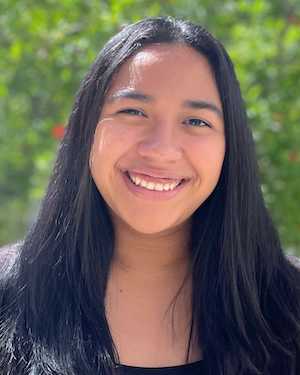
So What Now? ⟩
July 29, 2022, by Andrea
Classes First-Gen Getting Involved What are OS/OT?
So you just discovered OT. Maybe your overly excited roommate shared with you the major or you heard about the amazing occupational science minor classes, like Creativity Workshop from a classmate. No matter how you discovered OT, the field piqued your interest.
Now you may ask yourself, how can I learn more about OT and/or get involved at USC as an undergraduate student? Well, here are some ways you can do just that!
Pre-OT Club
The Pre-OT Club is a great way to learn more about OT through presentations, networking opportunities and guidance from current OT faculty members. The club is open to all USC undergraduate students interested in OT. From collaborations with other health profession clubs on campus to providing advisement for applying to OT graduate school, the Pre-OT club explores ways to dwell deeper into the field of OT.
OS Minor
Whether you have extra units, are ambitious to pick up a minor or are committed to applying to OT graduate school, pursuing an OS minor may be the right choice for you. Minoring in OS prepares you for the career of OT as well as exploring its uniqueness and versatility. Classes like Doing Social Justice and Creating a Sustainable Lifestyle are some examples of such versatility and how anyone can find their path to OT. I never miss an opportunity to recommend an OS class to my friends looking for a fulling class. One of my favorites to recommend is OT 100: THRIVE: Foundations of Well-Being. I took OT 100 online as a freshman and was able to foster vulnerability with my small group as we explored what it meant to thrive in all aspects of life. It’s a great course to learn more about well-being from an OT lens!
Volunteering
Getting hands-on experience is a great way to further your understanding of OT and the daily tasks of a therapist. Because of the many settings OTs can work in, consider volunteering at various sites and/or with different populations/communities. Click here to find a site!
Networking
The “Trojan Family” doesn’t just describe the relationships you build with other USC students, but also the relationships between faculty and students. Consider conducting an informational interview with a faculty member. After a coffee chat or zoom call, speaking with a current OT professional can provide you with relevant information about working in OT, expand your knowledge of the unique pathways, and provide guidance to your journey in OT. One of the ways I was able to network with USC Chan alumn was through the Trojan Network. During my time in the first-generation mentorship program, I was able to connect with current OTs who shared with me their journey to OT and her advice. Alum, Dr. Joyce Yoo, shared with me the importance of getting to know my colleagues and peers “as they are peers as they too are doors of future opportunities.”
In short, your journey to OT doesn’t start at the graduate level! The opportunities here at USC allow you to pursue OT at any point in your undergraduate experience.
As an undergraduate student myself, a rising junior in the BS-OTD program, I love to talk to other students about my passion for OT and always pitch the idea of exploring OT for themselves. If you need any more convincing, let’s have a chat!
⋯

Learning and Applying ⟩
July 15, 2022, by Andrea
Diversity First-Gen Getting Involved What are OS/OT?
Coming to USC, specifically to USC Chan, my passion for OT grew as I became more immersed in my classes and the opportunities for learning more about the profession. One of the ways I was able to explore my desires as a professional was through the Summer Institute.
I attended the Summer Institute in the summer of 2021 in the hope of gaining a clear direction in my journey as an OT student and exploring the unique disciplines. Throughout the six weeks, we explored our goals academically and professionally, gained mentorship, and the ways in which we can reduce health disparities in minority populations.
The most impactful week for me was when we held a student panel. It was a space where current students provided honest insight into their journey into OT as it related to their identities — first-generation and/or POC. Hearing from each panelist about how they were introduced and came to love their professions was definitely a highlight. The diversity in their journeys was a reminder that everyone has their own set path.
Some aspects that I continue to utilize even after the program are the tips on how to seek mentorship and professional development. Seeking mentorship can be a daunting task, but I was able to understand that it can be a process. It’s not always that the first person you cold email will respond. Being a mentee in any program requires flexibility, following up, and good communication. I utilized these skills in my sophomore year in the USC First-Generation Mentorship Program with my own mentor which better prepared me as a mentee. Learning how outreach to OT professionals was a skill I gained confidence in.
As the current cohort for the Summer Institute of 2022 is in the midst of their program, I encourage you to invest in fruitful connections within your cohort and faculty. Each person in that zoom call has a passion for OT and the ways we can impact our communities. Through my experience in the Summer Institute, my passion for serving the Latinx community was solidified and my confidence in my own journey was strengthened. The growth and learning don’t stop at the end of the six weeks, instead, it only marks the beginning of your journey as a healthcare professional.
Fight On!
⋯

How Shadowing Led Me to OT ⟩
June 29, 2022, by Andrea
What are OS/OT?
From a young age, I always knew I wanted to help people, and one of my greatest influences when pursuing a career in the medical field is my grandma.
My grandma immigrated to the United States from El Salvador in 1971 in hopes to advance her career as a nurse in the States. Even with little knowledge of the language, a new culture, and with minute support, my grandma was successful in her dreams. Over the next decade, my grandma has worked towards her aspiration and she became a registered nurse in the States in 1983.
Her heart for serving people is something I deeply admire. Whether I understood my admiration for her at age seven or not, my actions often reflected her work as a nurse. My sister and I would pretend to play “doctor” using each other as patients and as I got older, I would listen intently to her as she explained some of her fieldwork like checking blood sugar, or blood pressure.
You could probably guess the shock on my grandma’s face when I broke the news to her that I didn’t have an interest in following in her footsteps as a nurse. Despite this new revelation, I knew I still wanted to be in the medical field — what that looked like, I didn’t exactly know.
On my journey to discovering occupational therapy, I first settled on a possible career in optometry. I wore glasses since kindergarten and my yearly visits to the optometrist were always pleasant so this decision seemed the most practical. However, optometry didn’t ignite enough passion in me so soon this idea faded away.
Throughout high school, I took classes that would benefit me in a future career in health care. In my junior year of high school, I shadowed at a pediatric occupational therapy clinic. I shadowed the therapist throughout the day and after each patient, she would talk through her work, the fundamentals of OT, and how they applied to the activities I observed in her sessions. I appreciated her patience with my little knowledge about OT as she took her time to explain. Her passion for her work and care for her patients were infectious. During my time at this clinic, no other career path had sparked such joy and ambition in me the way occupational therapy had. After my shadowing experience, I was set on a career in OT. OT encompassed the values of patient care and a holistic view of health care.
With this new revelation, I applied to USC’s BS-MA occupational therapy program (now BS-OTD). As I enter my third year in my program, I continue to learn about the vast variety of specialties and the work OTs do. Through Chan’s many opportunities to get involved, even as an undergraduate student, like the OT/PT Summer Institute and the Vivir con Diabetes program, I have found enthusiasm in educating and providing occupational therapy services to the Latinx community.
⋯
Magic of GI ⟩
May 4, 2022, by Global Initiatives Team
Community International What are OS/OT?
By Maggie Goodfellow MA ’21, OTD ’22
Editors Alison Chang and Vanessa ElShamy
Entry-Level Professional Master’s students
If I told you there was magic behind one of the doors in CHP, would you believe me? Well, no — not the traditional type of ‘magic’ that involves playing cards or bunnies appearing out of hats, but rather, something even better. Behind the doors of CHP 161, you’ll find the magic of a global community, the magic of pushing boundaries, and the magic of discovering what it means to “grow together”. In case you couldn’t tell, the first word that comes to my mind when I think about Global Initiatives is . . . Magic (surprise!).
#1. The Magic of a Global Community. The door (and room) of CHP 161 can be quite deceiving at first glance. However, upon opening the door, you’ll immediately find a friendly face who will welcome you in and ask you about your day. As someone whose home is across the world in South Korea, the GI office quickly became my home away from home, somewhere I could go when I needed a break in between classes, somewhere I could trust would be welcoming and safe, and somewhere I knew a friend would be. The irony of our small office is that inside it lives a global community. Everyone’s culture is welcomed and the mundane interactions, such as sharing snacks from our respective countries or creating a poster for a holiday, become the building blocks of lifelong friendships. There’s something very special about the friendships built through GI, as they are grounded in our shared love for celebrating each other’s cultural differences and upbringings. Through Global Initiatives, I’ve seen the magic that can happen when you not only keep the door open for others, but also provide them with a seat, listen to what they have to say, and recognize there is always an opportunity to learn from them.
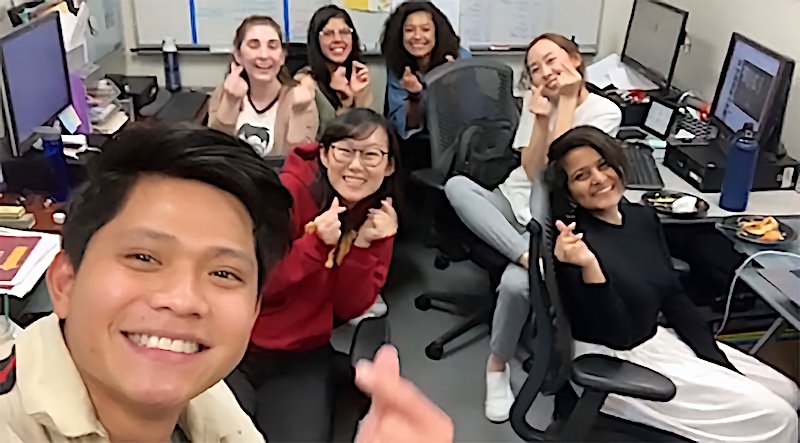
Moments in the office — our door is always open!
#2. The Magic of Pushing Boundaries. When it comes to magic tricks, you typically see the outcome but rarely see the hard work and determination that’s required to master them. More importantly, it takes confidence and the belief in yourself that you can do something that seems impossible. While it seems silly to compare the projects of GI to a magic trick, quite frankly, some of the projects did seem impossible at first. To name a few, just over the past 3 years our team has implemented Frientorship Circles, a global poster exchange, a global Pen Pal program, a “Global Citizenship” thread in the new Entry-Level OTD curriculum, and so much more. I’m incredibly grateful to this team who has time after time shared their creativity and demonstrated the power of creating something with their hearts and the intention to uplift others. Moreover, none of this would be possible without Danny Park, who empowers each member of our team to take their ideas and transform them into reality. Together, this is what creates the magic to push and continue pushing boundaries.
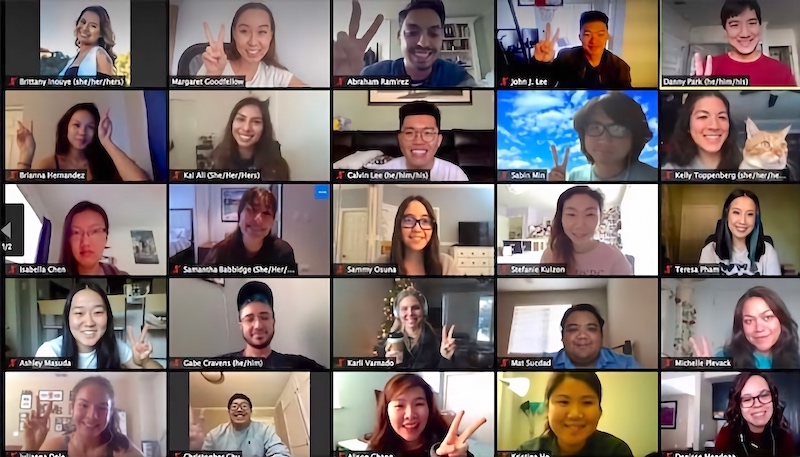
Friendtorship Circle meeting from 2020 — we had students from across all of Chan’s academic programs!
#3. The Magic of “Growing Together”. When I first joined Global Initiatives as a student worker, I was a first year MA-2 student who was eager to learn yet shy in voicing my opinions. It’s funny how, in just three years, I’m able to see so much growth in myself, both personally and professionally. Thank you, Global Initiatives, for being part of my journey and showing me that growth rarely happens alone — it happens through the mentorship and support of others. From celebrating birthdays to accomplishing various professional milestones together, I could not have asked for a better team to grow with by my side.
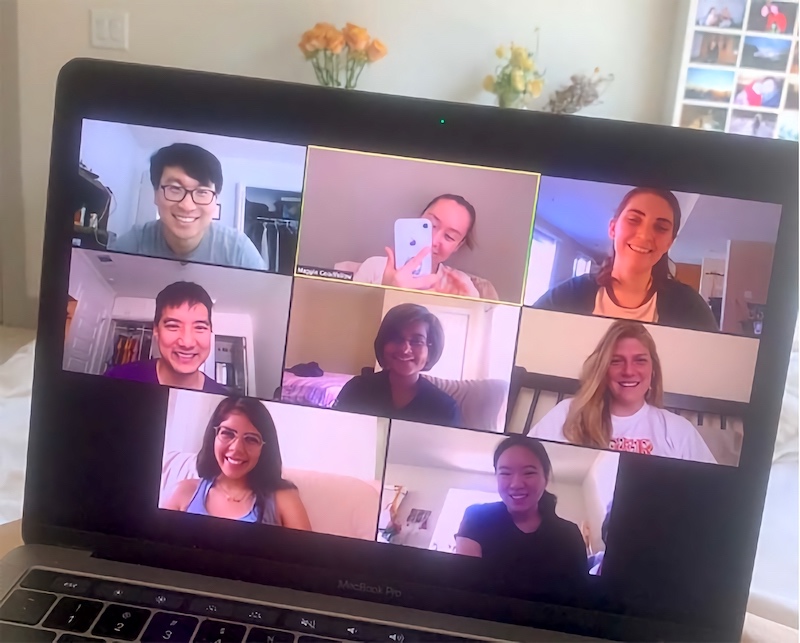
Fun fact — our team used to be 8 people total! We really have grown together individually and as an office
⋯
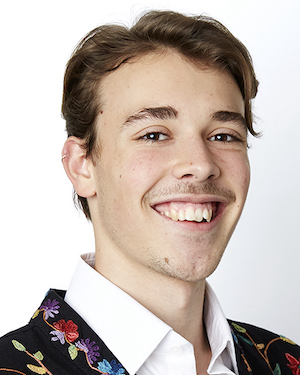
Humans of USC Chan Volume 3 ⟩
April 20, 2022, by Seth
Community Diversity What are OS/OT?
Committing to graduate school is a big decision and exploring which ones may be the best fit for you can be an equally arduous experience. I remember when I was looking into occupational therapy programs, I looked at the standard quality and cost components, but as a queer person, I was also looking for a place and a profession that I felt could let me blossom as I transitioned into a new life stage (i.e., adulthood, a professional, and, let’s be honest, a world outside of the closet). I wanted to know if I could drop my hairpins or if I had to censor myself. I wanted to know if I could bring LGBTQIA+ topics into the classroom without being anxious about how they would be received. Would I feel isolated or could I find a community? My community? What are my classmates’ experiences, and what can I learn from them? These questions can be hard to find and directly seeking them out can be intimidating or a moment of self-disclosure that may not feel right yet. After all, it’s not often you see these experiences plastered on a program’s website. So, I took it upon myself to do just that.
I hosted a forum with some LGBTQIA+ students within the Chan Division to talk about how they discovered occupational therapy, their relationship with the profession, and their experiences navigating an occupational therapy program. This is a video curated by a queer person in partnership with queer people. And this one is for the family! We even share some advice for those thinking of applying to a program. If you choose to watch it through YouTube, the video is time-stamped with each topic if you ever want to go back to a specific conversation.
I hope you find this video helpful and that these diverse perspectives give you more insight into what LGBTQIA+ student life is like in the Chan Division! Welcome back to the Humans of USC Chan!
⋯





